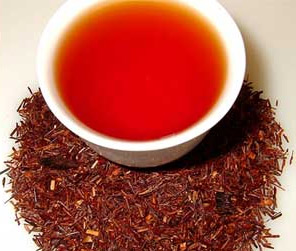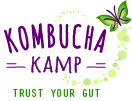
If you missed it, check out my post Caffeine & Kombucha Explained for more great info about the health benefits of tea and why caffeine from tea is proecssed differently by the body than other caffeine.
Kombucha is a healthful delicious beverage that contains, on average, about 1/3 the amount of caffeine of a regular cup of tea.
However, I hear from my readers all the time that they are sensitive to caffeine and want to know how to reduce or even eliminate the amount present in their Kombucha.
Why shouldn’t store bought decaffeinated teas be used? Often these teas have been treated with a chemical process, leaving them damaged and covered in a chemical residue. Not to mention the decaffeination methods used by most commercial producers robs the tea of many of the naturally occurring health benefits.
In this video, I show you my favorite method for doing so in the most natural way possible: “steep and dump.”
Try combining multiple methods listed in this video to reduce your caffeine to essentially zero without sacrificing health benefits or flavor.
Leave a comment letting me know if you make decaf Kombucha
and how you do it! I want to hear from you!
***
Note: Yes, it is possible to use only herbal tea to brew Kombucha. However, for the long term health of the Kombucha culture, it is recommended to mix in some tea (25%) or brew every 4th batch with real tea to reinvigorate the culture.
***

Marcey Lee
July 21, 2013 at 8:09 pmI just dumped Luzianne decaf iced green tea bags in my Kombucha. Am I screwed? It says “naturally decaffeinated. I might actually be screwed. First timer. Please help.
Hannah Crum
July 29, 2013 at 5:52 pmNot recommended but likely won’t screw up one batch. Be sure to use regular tea in your future batches to ensure the health of your SCOBY.
Klara
November 18, 2012 at 6:10 amI am making Kombucha for the first time and I used decaf green tea, not fully understanding whether caffeine was needed for the process. After watching your video I went back to look at the labels on the box of tea, and it says it has been naturally decaffeinated by using spring water and effervecense. I hope it doesn’t kill my scoby. I’ll use regular green tea next time.
Awesome video!
Paul
October 13, 2012 at 10:06 pmWhat about using rooibos? Unlike the options you mention, it’s naturally caffeine free.
Hannah Crum
October 15, 2012 at 12:05 amRooibos can be used in tea blends. I’ve not heard of any long term success using only Rooibos as the base. What do you use Paul?
Joyce Lenardson
June 12, 2012 at 10:06 pmHow do you maintain a Scoby hotel? Do you feed it sugar & add tea? How many could you keep in a gallon jar? I’ve never seen any explainations about the hotel. Also for how long. Thank You for your help. Joyce
Tasha
September 23, 2011 at 11:38 amIs it possible to make Kombucha with a tea that is naturally decaffeinated? I’m not one who would normally mind the caffeine in the Kombucha, but I’m pregnant and I really believe in not giving hardly any caffeine to the baby. I was think about using a peach tea or something similar. I like your tip on decaffeinating the tea, but there will still be some caffeine. Thank you.
hannah
September 23, 2011 at 1:30 pmTea by its definition contains caffeine. While some herbs or flowers may be used to brew KT in the primary fermentation, they don’t contain enough of what the culture needs to sustain itself over time. You will need to feed it some tea in order for it to thrive.
Sylvia
March 18, 2011 at 4:01 pmHow about lavendar?
hannah
March 21, 2011 at 2:50 pmHi Sylvia – do you mean using lavender as a flavoring or for the tea itself?